The feminist movement in America has had a major impact on American culture. It has led to the increased visibility of women in media, politics, and other fields.
It has also led to more women entering the workforce and greater opportunities for them to obtain higher-paying jobs. This has led to a rise in the pay gap between men and women, but it has also created new opportunities for women to succeed professionally.
Asian American culture is diverse as its population. This culture is influenced by the history of Asian immigrants to the United States and the differences due to the different regions of Asia.
We will explore how the feminist movement has impacted American society and culture. We will look at its impact on women’s rights, gender equality, and sexual liberation, as well as its contribution to social movements such as the LGBTQ+ community.
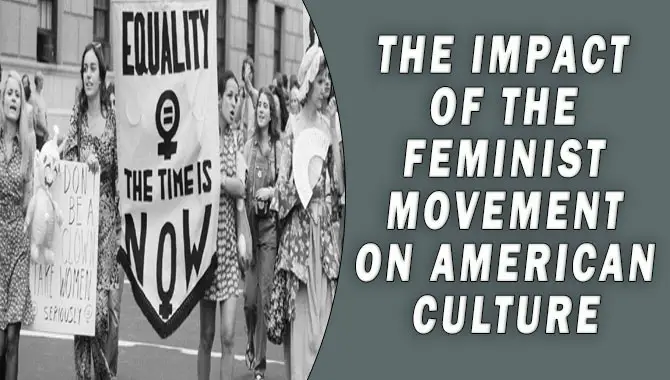
What Is The Feminist Movement?
The feminist movement is a series of social and political movements that seek to create equal opportunities and new freedoms for women. The movement’s goals include addressing reproductive rights, voting rights, domestic violence, the wage gap, parental leave, and basic needs security.
The women’s rights movement or women’s liberation movement was a social movement in the United States during the 1960s and ’70s that aimed to achieve equality and greater personal freedom for women. During this time, many people began questioning gender roles, arguing that men and women should treat equally. However, feminism’s goals have shifted over time and always focused on ending discrimination and violence against women.
The Impact Of The Feminist Movement On American Culture: Analysis On
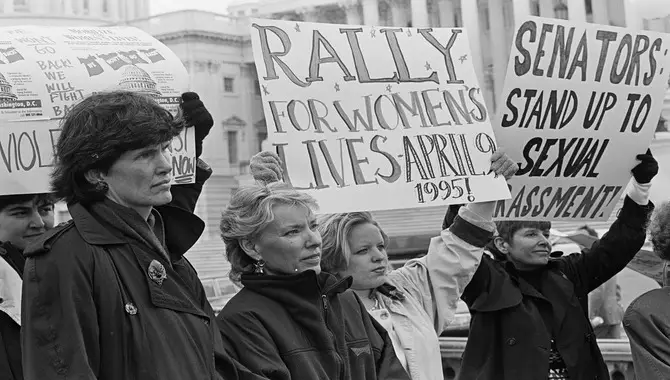
The feminist movement of the second half of the 20th century had a significant impact on American society, helping to advance women’s rights and challenge traditional gender roles. The movement is often associated with Betty Friedan’s book “The Feminine Mystique,” published in 1963, and helped bring attention to women’s dissatisfaction with traditional roles. The book outlined how women limits by society’s expectations and highlighted how women could use their intellect and capabilities to pursue personal fulfillment.
After reading this book, many women began to question the gender norms of the time and began to seek equal rights for themselves. This led to the development of second-wave feminism, which brought about important social reforms such as improving access to education, providing women with reproductive rights, and giving women equal opportunities in politics.
As feminism evolved, it also recognized the diversity of women’s experiences and highlighted the need to address social norms that discriminate against women on various grounds. For instance, feminism has led to increased awareness about sexual harassment at work and other sexual violence against women. This has also helped create greater gender equality in the workplace and other areas of life.
The History Of The Feminist Movement In America
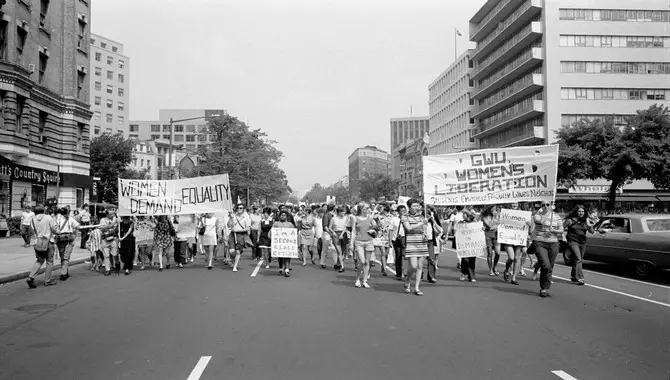
The feminist movement in the United States began in the early 20th century with the Seneca Falls Convention, a women’s rights convention held in upstate New York in 1848. The convention organizes by women seeking civil rights, including the right to vote and hold public office. This convention was the first of its kind and was attended by activists from across the country.
The ideas espoused at this event were based on women’s rights being granted to them by God or nature and not by governments or culture. These activists brought attention to domestic labor, sexual liberation, and equal pay for equal work.
One of the most influential feminists of all time is Betty Friedan. Her 1963 book “The Feminine Mystique” brought attention to the lack of identity and purpose in women’s lives. Friedan argued that women had been forced into domesticity by a culture that valued housework and motherhood highly.
She argued that women should break free of this role and pursue their interests and goals outside domestic life. This sparked a movement encouraging women to attain personal satisfaction and self-fulfillment regardless of their family or marital status.
In 1991, the United States commemorated Women’s Equality Day, which commemorates Oct. 26, 1857 — the date when President James Buchanan signed into law the bill giving women the right to vote in federal elections nationwide — by displaying a monument honoring Elizabeth Cady Stanton, Susan B. Anthony, and Lucretia Mott in the rotunda of the U.S. Capitol.
The Future Of Feminism In America
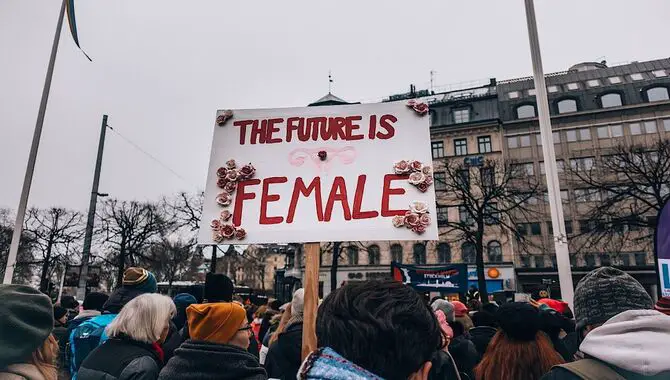
The fourth wave of feminism in the U.S. is currently underway, with the MeToo movement and the 2017 Women’s March leading the charge. In recent years, grassroots activism has become vital to pushing the feminist movement forward and bringing attention to the issues faced. Women’s organizations must strive to include people of all races and backgrounds to maintain unity and solidarity among women.
Feminist thought is beginning to recognize the diversity among women and the various experiences each one has. It is important to address all women’s issues and strive for gender equity and civil rights. As feminism evolves, it will continue to spotlight important issues facing women across the globe, such as gender-based violence, reproductive rights. And fair employment opportunities.
The Goals Of The Feminist Movement
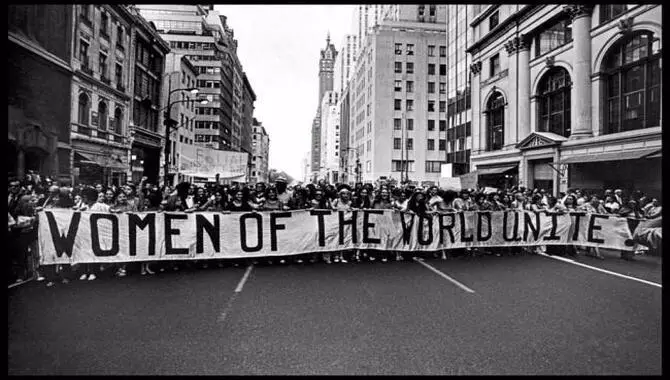
The women’s rights movement of the 1960s and ’70s was the first to address legal inequalities between men and women. The main goals of this movement were to call for equal rights, access to resources, and justice for women. It addressed issues like gender discrimination in the workplace, rape culture, domestic violence, sexual harassment, and sexual assault.
The Feminist movement also sought gender equality at home. This meant greater reproductive rights, such as access to abortion and birth control, and gender-neutral parenting. In addition to these legal issues, feminists challenged traditional women’s societal roles by campaigning for equal pay and representation in politics. The movement’s aim remained the same throughout its lifespan. Ending discrimination and violence against women by pursuing social and legal reform.
Effects Of Feminism On Women And Men

The women’s rights movement of the 1960s and 1970s sought to address legal inequalities between men and women. Give women greater reproductive rights, and challenge traditional women’s societal roles. This movement led to several important victories for women and girls, including the passage of Title IX.
Which prohibits gender discrimination in education programs that receive federal funding; the establishment of childcare tax credits. And the passage of the Pregnancy Discrimination Act. Which prohibits employers from discriminating against women for taking time off to care for children or sick family members.
Second-wave feminism was also marked by many important battles, both politically and culturally. For example, second-wave feminists fought for equal pay for equal work, against sexual harassment, and promoted sex education. These battles were not without controversy. Some critics pointed out that second-wave feminism focused too much on women’s issues without addressing men’s issues.
The organization founded by Betty Friedan was the National Organization for Women (NOW). The organization became famous for its political activism and activism on behalf of women’s rights. It played a key role in calling attention to sexual harassment issues and advocating for women’s reproductive rights. By advocating for women’s rights and gender equality, second-wave feminists paved the way for other movements fighting similar issues in our modern world.
How Has The Feminist Movement Changed American Culture?
The women’s rights movement has been a focal point of the feminist movement since the 19th century, leading to greater legal rights and opportunities for women in the United States. These include the right to vote and equal pay for equal work. However, women’s suffrage has been a focal point of the movement since the late 19th century, leading to greater legal rights for women. However, feminists have also focused on inequalities embedded in social norms rather than laws.
The second wave of feminism in the 1960s and 1970s focused on inequalities embedded in social norms rather than laws. This time saw further political activism from women’s liberation groups like the National Organization for Women (NOW) and consciousness-raising circles that encouraged women to speak out against sexism and inequality. The movement was also marked by greater activism toward fighting the oppression of women on different grounds, including sexuality, race, class, and disability.
In recent years, feminism has expanded beyond legal equality to encompass social and economic equality. Lesbian feminism has emerged as a current within the movement, and women of color have articulated their versions of feminism. The women’s rights movement has fought for greater personal freedom for women, such as equal treatment at the workplace and in unions, childcare, and reproductive rights.
What Are The Long-Term Implications Of The Feminist Movement On American Culture?
The feminist movement has significantly impacted American culture in the past several decades. It has worked to end discrimination and violence against women through social and legal reform. Through the movement, women have been able to gain access to education. And other opportunities that were previously unavailable to them.
The movement has also worked to close the wage gap between men and women and secure parental leave and security for basic needs. Second-wave feminism has also worked to challenge the mainstream media’s image of women and create a more equitable society for all.
This movement has helped improve societal views about women, their rights, and they’re worth in society. Overall, the feminist movement has made important contributions to American culture by advocating for equality, equity, and justice for women.
What Are Some Of The Consequences Of The Feminist Movement?
The feminist movement has significantly impacted women’s rights in the modern world. Some of its consequences include increased opportunities for women in education, voting rights, employment, and other areas of life. It has led to greater reproductive rights for women, the ability to challenge traditional gender roles. And the right to credit cards and other financial services.
These movements have also resulted in laws and regulations to protect women from violence and discrimination. More women are coming forward and voicing their opinions on issues like sexual harassment, domestic abuse, and rape. Women now have more opportunities to be leaders in various fields and make their mark. Not only that, but they are also aware of the wage gap between men and women, pushing for equal pay as a result. Overall, these movements have given women an equal footing in society without hesitation.
Conclusion
The feminist movement has changed American culture by bringing gender equality, sexual liberation, and women’s rights to the forefront of national discourse. The movement has been coming along, but its success is evident because it has impacted many aspects of society.
However, there are still a lot of things we can do to further the movement’s goals. It is essential to keep talking about feminism and supporting women who work for gender equality. As more people support feminism, it will become more mainstream and accepted.
Frequently Asked Questions
1.What Was The Impact Of The Feminist Movement On American Culture?
Ans: The feminist movement of the 1960s and 70s had a significant impact on American culture. Its main goals were addressing legal inequalities and giving women greater reproductive rights. It also challenged traditional gender roles and societal expectations of women. Additionally, the first wave of feminism in the late 19th. And early 20th century was closely related to the women’s suffrage movement and focused on winning woman’s suffrage.
2.What Was The Impact Of Feminism On Politics And Government?
Ans: The Women’s Rights Movement had a profound impact on politics and government. By challenging traditional gender roles, activists helped to create equal opportunities for women in education. And challenged the legal inequalities between men and women. In addition, they fought for greater reproductive rights and opportunities. Such as the right to vote, advance in their professional careers, and own property.
3.What Are Some Ways In Which Feminists Have Changed American Culture Today?
Ans: Some ways in which feminists have changed American culture today include the following:
- Working to achieve the right to vote and other legal rights: Early feminists fought for women’s right to vote by staging protests, writing treatises, and lobbying lawmakers. As a result of their activism, women achieved the right to vote in America in 1920.
- Challenging social norms: Second-wave feminists rejected traditional notions of femininity and womanhood and sought to redefine female identity. They argued that social norms oppressing women should be addressed through legislation, not just through individual choice or interpretation of the law.
4.Did Feminism Make Women Happier Or More Miserable Than They Were Before The Movement Began?
Ans: As the title of this question suggests, many people believe that feminism made women miserable rather than happier.
A wave of feminism rooted in the late 19th and early 20th centuries focused on legal inequalities and granting women the right to vote. This was a major step forward for women, giving them a voice and a platform to demand equality. However, feminists of this era also fought for other important rights, such as the right to education and the ability to participate in the workforce without discrimination.
5.Did Feminism Change How Men And Women Think About Each Other, And What Are Some Of Its Effects On American Society Today?
Ans: Feminism has significantly impacted American society, with women achieving greater personal freedom and opportunities in politics, work, the family, and sexuality. However, its effects on men and women are still being discussed and debated.

I’m a writer and blogger who loves to talk about entertainment, culture, and relationships. I love to share my thoughts and insights on these topics, and I’m always looking for new ways to engage with my readers. I’m also a big fan of learning new things, so I’m always exploring new areas of interest.
